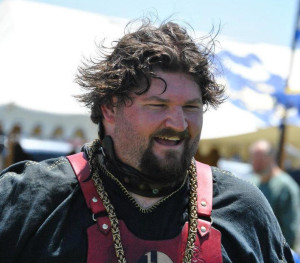The rime royal, also known as the Chaucerian stanza, was a popular Renaissance poetry form in England and France, and remained quite popular with Scottish poets. The stanza is 7 iambic pentameter lines, with the rhyming pattern ababbcc. It is rarely seen as a single stanza poem, but often used as a narrative stanza for storytelling.
Sir Ilia is an 11th century Rus bodyguard. His Lady bears 3 orthodox crosses in her arms, which gave me the idea that Sir Ilia might be Christian, as well. While searching for persona information, which may or may not offer inspiration for my poem, I came across many stories about the brothers, Boris and Gleb, the first two saints canonized in Kievan  Rus. They were sons of Vladimir the Great, who ruled from 980-1015. Both were murdered during the internecine wars of 1015-1019, and canonized by the Orthodox Church, in Rus, in 1071.
Rus. They were sons of Vladimir the Great, who ruled from 980-1015. Both were murdered during the internecine wars of 1015-1019, and canonized by the Orthodox Church, in Rus, in 1071.
During an assassination attempt, Boris was stabbed and left for dead. As his body was being transported to Kiev in a sack, he was discovered to be still breathing. With several sure thrusts, Varangian swords quickly put him out of his misery. As Gleb knelt, praying beside the body of his brother, he was assassinated by his own cook, with a knife from his own table.
Sir Ilia’s fight for the Crown of Caid pitted him against two Varangians, who were soundly defeated. His first defeat was by the hand of a brother knight and fellow cook, Sir Jamal Damien Marcus. The opponent who ultimately ended Sir Ilia’s quest was the man who would be Prince of Caid, Sir Mansur.
————-<>————-
Sir Ilia Aleksandrovich
fallen in Fall Crown Tourney, A.S. XLVII
(rime royal)
While wagons labored under weight of sky
And travelers blistered aside tourney field
This knight, unshaken by his foes nearby
Stood tall and ready, armed with sword and shield.
By setting sun, our future king revealed.
His Lady Dragon watching, rapt in wait
Sent prayers that intercessors guard his fate.
First, one of equal size would stand his way
But soon he fell to Ilia’s quicker blows
Shortly, one Varangian Guard would pay
A debt of life for Boris’s repose
And Peacock add felled Rabbit to her woes.
This knight, still standing under sluggish swords
Held on to hope that he would reap rewards.
But, Golden Eagle traded blow for blow
Until one cook was fallen in the end
The striking Eagle conquered prey below
And brother knight now made a foe of friend.
A prayer too late that Saint Gleb may forfend.
Still, not the last for this master Rus knight
He stood, again, armed ready for the fight.
A second Guardsman took his final strike
Another debt for Princes-saints was paid
And once the Black Bull forfeited his life
He lost with it the wager he had laid.
By setting sun, the end of game was played.
Well practiced blows fell swift through thinning air.
And He, who would be Prince, would lay him there.
– Bannthegn Beathog nic Dhonnchaidh
. . . is a 14th century bard who can often be seen traveling far from her home in the Highlands with her lord husband and muse. If a good tale crosses her path, she will sing a song about it, pull out its hair and spin it, or throw it in a pot and cook it up.
